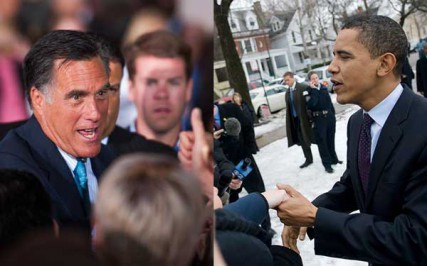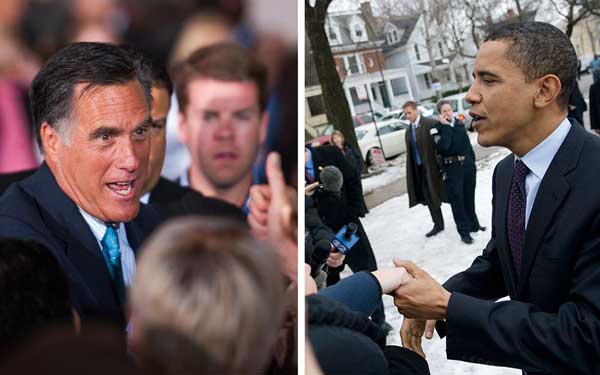(RNS) Most Americans who know that Mitt Romney is Mormon say the presumptive GOP nominee’s faith doesn’t concern them. But a new poll indicates there may be an “enthusiasm gap” for Romney among white evangelicals, a crucial GOP constituency.
Sixty percent of Americans know that Romney is a member of the Church of Jesus Christ of Latter-day Saints, according to a survey released Thursday (July 26) by the nonpartisan Pew Research Center. That number has barely budged since March, despite intense media focus on Romney’s faith.

Interestingly, more Americans know that Romney is Mormon than can correctly identify President Obama as Christian (49 percent).
Although most Americans say it is important for a president to have strong religious beliefs, party affiliation — rather than religion — drives voter preferences, Pew found.
Among Americans who know Romney’s religion, six in 10 say they are comfortable with it. Republicans (68 percent) are more likely than Independents (62 percent) and Democrats (51 percent) to express comfort with the likely GOP nominee’s faith.
But nearly one in four white evangelicals say they are uncomfortable with Romney’s Mormonism, higher than any other religious group except atheists/agnostics (30 percent).
Many social conservatives warned during the GOP primary that Romney would struggle to spark evangelical enthusiasm. Fewer conservative Christians would volunteer to canvass neighborhoods, donate money or plan rallies, they said.
The Pew poll indicates such fears may be warranted. Among the nearly 23 percent of evangelicals who are uncomfortable with Romney’s Mormonism, just 16 percent back him strongly.
“There is definitely an enthusiasm gap there,” said Greg Smith, a senior researcher at Pew. Smith noted, however, that 93 percent of conservatives still say they will vote for Romney.
Evangelicals constituted nearly a quarter of the 2008 presidential electorate, according to exit polls. Sen. John McCain, then the GOP nominee, received 74 percent of their votes, with President Obama winning 26 percent. Evangelicals' dislike of Obama's policies may drive that number down in 2012. According to a Public Religion Research Institute poll in May, just 19 percent of evangelicals support Obama.
Obama also continues to struggle with perceptions of his religion, according to Pew.
The percentage of Americans who know that Obama is a Christian has increased from 38 to 49 percent since 2010, but there has been little change in the percentage who mistakenly believe that he is Muslim (19 percent in 2010; 17 percent in 2012).
Pew found that perceptions of Obama’s faith fall into partisan camps. Nearly a third of Republicans believe that Obama is Muslim, compared to 16 percent of independents and 8 percent of Democrats. Two-thirds of those who think Obama is Muslim say they are uncomfortable with his religion.
Conversely, just seven percent of Democrats and liberal-leaning Americans have concerns about Obama’s faith.
The national survey was conducted from June 28 to July 9 among 2,973 adults, including 2,373 registered voters, by the Pew Research Center’s Forum on Religion and Public Life and the Pew Research Center for the People and the Press. The margin of error is plus or minus 2.1 percentage points.





